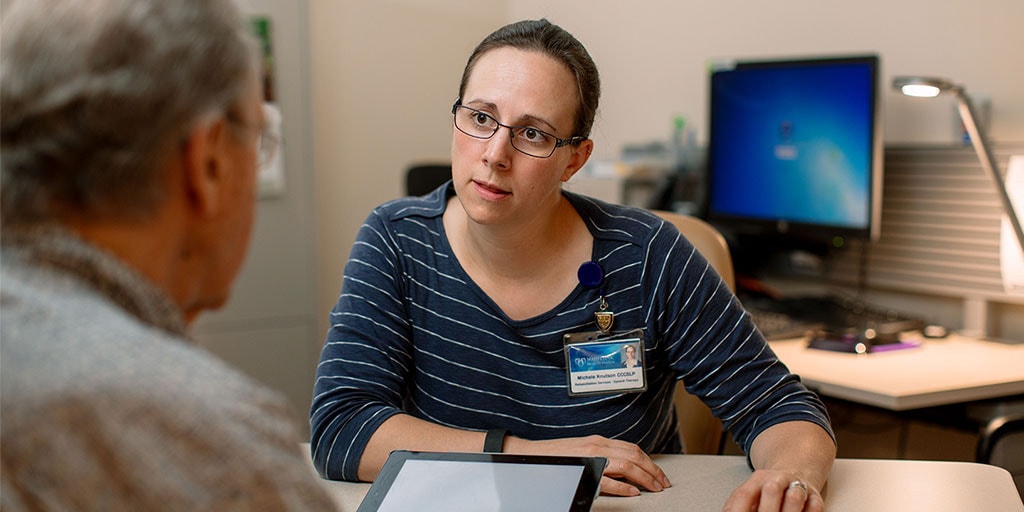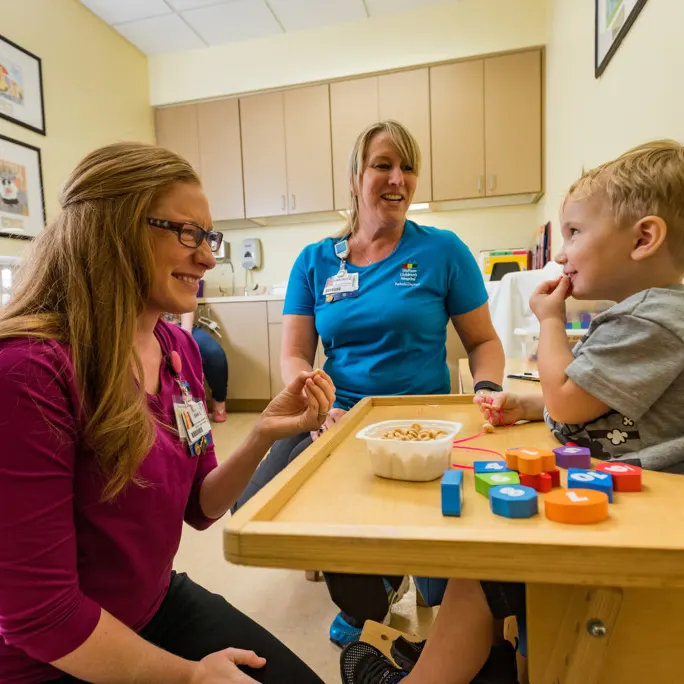How a Speech Pathologist Works with Schools to Improve Student Outcomes
How a Speech Pathologist Works with Schools to Improve Student Outcomes
Blog Article
How a Speech Pathologist Can Aid Improve Interaction Abilities
Efficient communication is a keystone of individual and expert success, yet numerous individuals encounter challenges that prevent their capability to express themselves plainly. A speech pathologist is furnished to deal with these barriers with targeted assessment and treatment techniques customized to every person's demands. By utilizing evidence-based healing methods, they not just work to boost speech and language conditions yet likewise boost overall communicative skills. Understanding the diverse duty of a speech pathologist exposes how their expertise can transform lives, welcoming a closer assessment of the specific methods and end results connected with their method.
Recognizing Communication Disorders
Comprehending communication conditions is essential for recognizing how they impact individuals' capability to reveal themselves and engage with others. Communication conditions include a broad variety of problems that impact speech, language, and social communication, commonly preventing reliable interaction. These conditions can occur from different factors, consisting of neurological conditions, developing delays, physical impairments, or mental concerns.
Speech disorders may manifest as difficulties in expression, voice, or fluency manufacturing, impacting exactly how words are noticable or spoken. Language disorders, on the various other hand, entail difficulties in understanding or using language, which can impede both spoken and non-verbal communication. Social interaction conditions are characterized by troubles in the practical aspects of interaction, such as taking turns in discussion or understanding social hints.
The consequences of interaction conditions are profound, influencing not only the person's ability to share feelings and thoughts however also their social partnerships, academic opportunities, and general quality of life. Recognition of these conditions can cultivate compassion and support, motivating reliable approaches for communication and interaction. Recognizing the intricacies of interaction conditions is a vital step in the direction of promoting inclusivity and addressing the requirements of those affected.
Role of a Speech Pathologist
Speech pathologists regularly play a crucial function in diagnosing and treating communication conditions, employing a series of evidence-based strategies tailored per person's requirements. These specialists deal with people across the life expectancy, from children with speech hold-ups to grownups recovering from strokes or traumatic brain injuries. Their knowledge incorporates a selection of communication problems, consisting of expression, language, fluency, and voice problems.
In therapeutic settings, speech pathologists use organized treatments made to boost interaction abilities. They might carry out strategies such as speech workouts, language video games, and social interaction training to promote improvements in responsive and expressive language capabilities. Speech Pathologist. Furthermore, they inform clients and their families about effective interaction methods and adaptive methods to navigate everyday communications
Beyond straight therapy, speech pathologists collaborate with other healthcare teachers, caregivers, and specialists to make certain a thorough technique to treatment. They promote for clients by providing sources and assistance, allowing individuals to attain their interaction goals and boost their general quality of life. As specialists in the field, speech pathologists are important in promoting reliable communication, advertising independence, and enhancing social involvement for those with communication difficulties.
Assessment and Medical Diagnosis Process
The analysis and diagnosis procedure conducted by speech pathologists commonly includes a detailed evaluation to determine interaction conditions properly. This process begins with a thorough situation background, where the clinician collects relevant info concerning the individual's medical, instructional, and developmental background. Recognizing the context of the individual's communication problems is crucial for an accurate diagnosis.
Complying with the medical history, speech pathologists use informal evaluations and standardized examinations to evaluate various aspects of communication, including speech noise production, language understanding, meaningful language, and social interaction abilities. These analyses are tailored to the person's age and specific issues, offering important information for evaluation.
Monitoring is also a crucial component of the assessment process, as it allows the clinician to see firsthand how the individual connects in all-natural setups. Furthermore, interviews with relative and instructors can offer insight right into the person's interaction challenges across different settings.
As soon as the examination is total, the speech pathologist synthesizes the searchings for to establish a medical diagnosis and suggest suitable interventions. This thorough analysis process ensures that people get targeted support customized to their one-of-a-kind communication needs, laying the foundation for reliable restorative strategies.
Healing Strategies and Techniques
Many restorative strategies and methods are employed by speech pathologists to resolve a variety of interaction conditions effectively. One commonly utilized technique is articulation therapy, which concentrates on dealing with speech seems via repeating and aesthetic signs. This method is specifically useful for people with speech sound disorders.
One more reliable strategy is language treatment, which boosts both responsive and meaningful language abilities. This might involve interactive activities that advertise vocabulary growth, sentence structure understanding, and conversational abilities. In addition, speech pathologists typically make use of social skills training to enhance practical language capacities, enabling individuals to browse Read Full Report social interactions much more effectively.
Fluency shaping and stuttering alteration techniques are specifically developed to help those experiencing fluency problems. These approaches assist customers establish smoother speech patterns and take care of the psychological and physical components of stuttering.
Furthermore, augmentative and different communication (AAC) systems are employed for individuals with extreme interaction disabilities. These systems, which can include motions, icons, or electronic devices, provide important support for reliable interaction.
Benefits of Speech Treatment

In addition, speech therapy can help in developing crucial listening and comprehension skills, cultivating better communication in discussions. Individuals with cognitive-communication conditions can likewise benefit, go to these guys as treatment concentrates on reinforcing memory and problem-solving capabilities, crucial for effective communication.
An additional critical element is the psychological assistance provided during therapy sessions. Speech pathologists develop a secure environment, encouraging clients to get rid of anxiety and stress related to their communication issues. This support can result in enhanced self-worth and total psychological health.
Moreover, early intervention through speech treatment can protect against further issues, making certain that people reach their complete communicative potential. In general, the benefits of speech therapy extend past plain speech renovation, favorably affecting different measurements of life for those influenced by interaction problems.
Final Thought
In summary, speech pathologists play an important function in dealing with communication problems via analysis, medical diagnosis, and tailored therapeutic treatments. By using evidence-based methods, these experts enhance people' speech and language abilities, fostering improved quality, fluency, and social communication skills. The advantages of very early intervention emphasize the value of seeking aid from speech pathologists, as their proficiency can significantly boost communicative capacity, ultimately bring about higher success in both professional and individual spheres.

Speech pathologists regularly play an important role in detecting and treating interaction disorders, employing a variety of evidence-based strategies tailored to each individual's requirements. As professionals in the field, speech pathologists are crucial in fostering efficient communication, advertising freedom, and enhancing social participation for those with communication difficulties.

Report this page